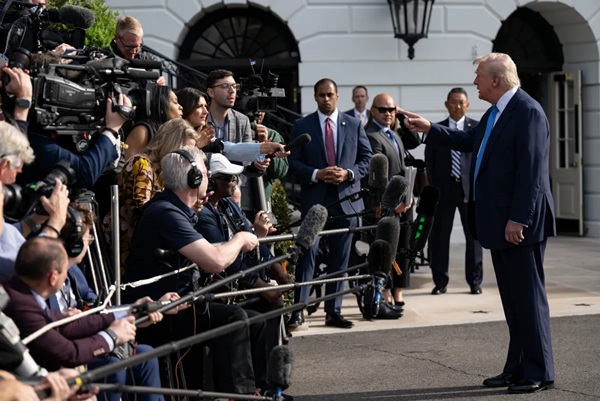.png)
Trump Will Tom-Tom if Deal Happens, But India Must Stay on Tiptoe
Trump’s drama-driven diplomacy looms over US-India trade talks. Can New Delhi stay steady amid showy proclamations and shifting deals? Strategic patience may be India’s best defence.


Dr. Srinath Sridharan is a Corporate Advisor & Independent Director on Corporate Boards. He is the author of ‘Family and Dhanda’.
July 23, 2025 at 6:32 AM IST
As trade talks with Washington progress, India faces the risk of sudden unilateral declarations and shifting narratives that can undermine careful diplomacy. This is exactly why India must combine strategic patience with institutional discipline to protect its interests in an era where theatrical announcements can outweigh negotiated substance.
It is tempting, almost reassuring, to hope that the United States might approach trade negotiations with India in a spirit of quiet deliberation and mutual respect. Yet to expect such calibrated conduct from President Trump risks lapsing into wishful thinking. For he has shown, repeatedly and openly, a preference for bypassing diplomatic convention, ignoring institutional channels, and substituting personal proclamation for careful process. This is not a passing quirk of temperament but a reflection of a new process under his leadership, shaped by politics that rewards disruption over dialogue and spectacle over substance.
The record is instructive. In 2019, during a press conference with Pakistan’s Prime Minister, President Trump announced that Prime Minister Modi had asked him to “mediate” on Kashmir — a claim that India promptly and firmly denied. At the G7 summit in 2018, he abruptly withdrew US support from a painstakingly negotiated joint communiqué after having already departed the meeting. And in 2020, he proclaimed a ‘done deal’ with China that, in reality, left the thorniest structural issues unresolved. Such pronouncements, broadcast instantly to millions, can eclipse weeks or months of quiet diplomatic work and create the illusion of agreement long before facts catch up.
This question has surfaced sharply in recent weeks, as a note by the Global Trade Research Initiative, reported by BasisPoint Insight, warned that India could face the same lopsided terms the United States recently claimed to have secured with Indonesia and Vietnam.
The so-called “done deals” President Trump announced with these countries reveal a striking disregard for the slow, often painstaking nature of international economic dialogue. His claim of imposing a 20% tariff on Vietnamese goods, when Vietnamese officials clarified they had agreed only to eleven, unsettled markets and sowed confusion. With Indonesia, the promise of giving the United States full access to domestic markets while accepting a 19% duty on Indonesian exports raised sharp questions about fairness, sovereignty and long-term strategy, and Indonesian officials distanced themselves from what had been publicly claimed.
For India, the stakes could scarcely be higher. The country’s economic complexity, large rural base and sensitive agricultural and dairy sectors mean that even a modest imbalance could inflict real harm. A deal that opens Indian markets to duty-free US goods without matching openings for Indian exports risks eroding livelihoods and weakening domestic industry. Yet there remains every chance that President Trump might still present such an outcome as a triumph of tough bargaining, regardless of its consequences.
India must also remain alert to something subtler. While it rightly values its strategic alignment with the United States, there is a risk that President Trump’s narrative might cast India less as an emerging global power in its own right, and more as a junior partner enlisted to support American objectives. Such a framing may fit a domestic political script in Washington but sits awkwardly with India’s broader aspiration to help shape, rather than merely follow, the changing global order.
Equally, India must prepare itself for the practical challenge of managing diplomatic confusion that may arise from unpredictable conduct it cannot easily confront or correct in public. It must be ready to navigate such moments while safeguarding core interests and preserving strategic partnerships. This is the pressure of a more transactional global politics, shaped by the individual glory and theatrics of larger-than-life leaders who prize spectacle over subtlety. It demands not only negotiating skill but also institutional steadiness, so that momentary claims or unilateral declarations do not force policy choices that serve another’s narrative rather than India’s own considered strategy.
President Trump has made clear that he favours the immediacy of social media over the slow craft of statecraft, and the drama of him announcing ‘anything’ over the substance of bilateral agreement. That is what will be the toughest path to navigate in the US-India trade deal, apart from the content of the actual agreement. And what India would need to give in, or give up, for the deal.
The question, then, is whether India can build a negotiating posture resilient to such unpredictability. That will test its discipline, political patience and market transparency, ensuring that no claim, however sweeping, is mistaken for a balanced accord. In the end, diplomacy must not mirror the mood of a counterpart. It is precisely when confronted with unpredictability that caution, calm and precision become geopolitical necessities.



